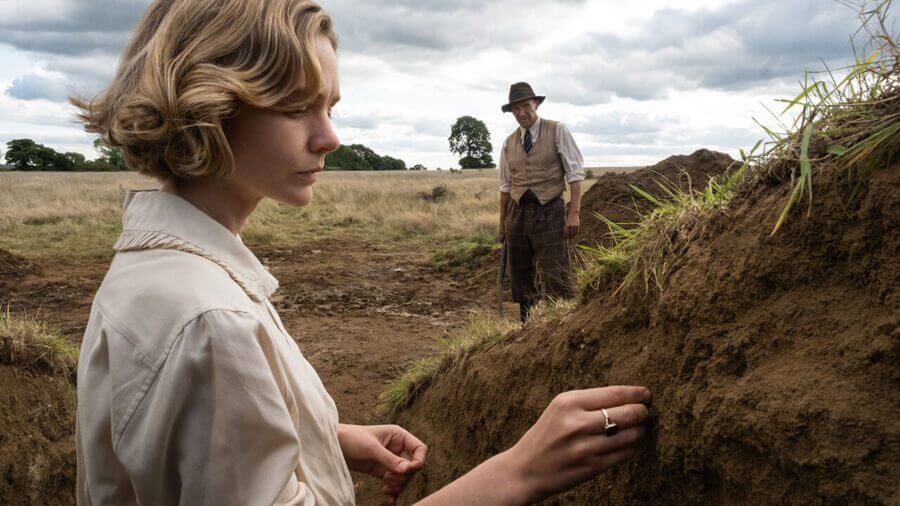The rules state it's not awards season without at least one well-dressed but emotionally inert British period drama in the mix. (It's just about the only thing we have left to export.) This year, Netflix has thrown its ever more considerable weight behind The Dig, a film of John Preston's 2007 novel about the real-life Sutton Hoo excavation of 1939, adapted by Moira Buffini (Tamara Drewe, the 2011 Jane Eyre) and directed by Simon Stone (The Daughter). To some degree, it's unusual material, as Preston's focal point wasn't a country manse but a field in Suffolk, some distance beyond anybody's back garden. It's here we watch disparate souls converge. Firstly, there is the widowed landowner Edith Pretty (Carey Mulligan), who thinks this field might be hiding something of note, and the solitary archaeologist, Basil Brown, she calls in to investigate further. Even the positive references Mrs. Pretty obtains describes Brown as "difficult", which makes this a perfect role for Ralph Fiennes, his air of recessive reluctance only mildly tempered by an Adge Cutler accent and a Hulot-like pipe. Soon, it becomes clear that no film this year will be more aptly titled. Basil's initial dig turns up nothing very much; yet when he digs some more, he turns up some old Anglo-Saxon wood. Committing anew to his task, Basil resumes digging, and after a brief, rapidly overcome setback - digging so fast he causes a collapse that nearly does for him - he digs up evidence of an old Anglo-Saxon ship. So he digs some more, and when he gets tired of digging, he recruits a team of helping hands to take up the trowel, including a Rugged Type (Johnny Flynn) and a tweedy couple in matching shell-rimmed specs (Ben Chaplin and Simperin' Lily James). That's right: Netflix have only gone and thrown millions at a medium-screen reboot of Tony Robinson's Time Team.
Now: what you need to know about The Dig going in is that it heralds from a country that for decades has devoted no small part of its Sunday night television schedule to a grey thing called Antiques Roadshow, where crowds gather in the grounds of stately homes they wouldn't ordinarily be allowed near to watch experts evaluating relics belonging to individuals who scarcely appear much younger than the objects they're touting. To this day, I remain unable to watch even fifteen seconds of this loathsome, backward irrelevance without feeling my hair turning white and my arteries hardening over. (Just a few notes of the theme tune's twee awfulness is enough to remind me of the doldrums of a Sunday evening, and make me panic that I haven't complete my school homework assignments.) Brits remain suckers for their own history, as recent political events and TV hits have underlined, and The Dig is clearly digging with an eye to tapping this lucrative vein of self-regard. But I'm not at all sure the film ever gets much beyond surface-deep, and the insights this dig unearths are of negligible value. "It speaks, dunnit - the past," grumps Basil, in one of those Lines of Significant Dialogue that probably sound more profound in the context of a trailer. I mean: yeah, clearly it does to some. Yet I would wager there are many more of us who've spent the best part of the past decade wishing it would just shut the hell up every once in a while.
Stone has a few elegant visual tricks on standby to liven up the fusty, stuffy milieu he finds himself working within. He's a big fan of overhead shots that further isolate his lonely leads, or define the furrows they're working within. And as The Dig expands into more of an ensemble piece - an Archaeologists Assemble - it succeeds in opening up small pockets of eccentric life. I enjoyed Ken Stott as a bowtied representative of the prestigious Ipswich Museum, threatening to trample all over the burial site. ("You can't come in here!," Basil grumps at him. "Not a man of your size.") Yet these are few and far between, and outnumbered by episodes of Atonement-level English Ridiculousness: a suppressed homoerotic moment as two of the more sketchily defined diggers glance over at each other's tools, Chaplin going into spluttering mode after he walks in on Simperin' Lily in the bath. Clearly, one or more of the producers felt there was too much digging in places, and so they've prodded Buffini into inserting some contrived action: Basil realising he's forgotten to throw a tarpaulin over the site mid-rainstorm, a huge fuss as a fighter plane goes down in an adjacent river. In Preston's book, all this might have served as scene-setting context; here, these episodes are offered as zero-to-low-octane distraction from the unavoidable truth that this is fundamentally a film about people digging themselves ever deeper into a hole in pursuit of what we already know is there. As a non-motion picture, it's all but a dead loss; but as a film-metaphor for Brexit Britain, The Dig is pretty much unimprovable.The Dig will be available to stream on Netflix from Friday.

No comments:
Post a Comment